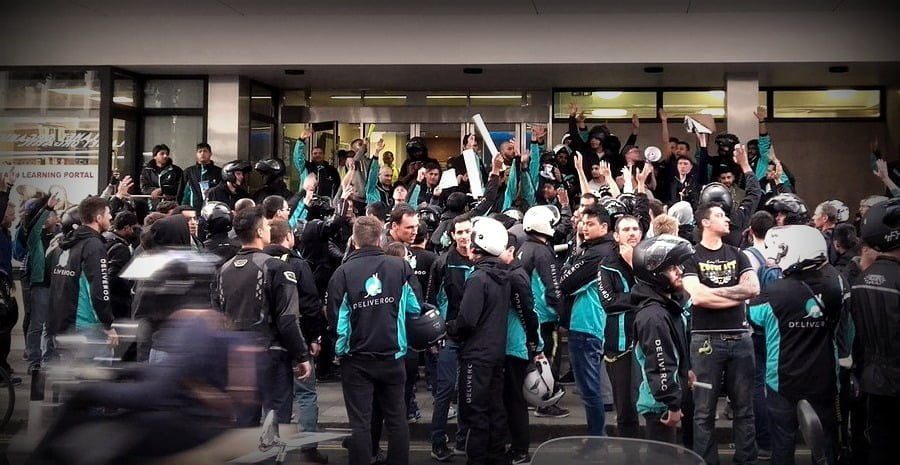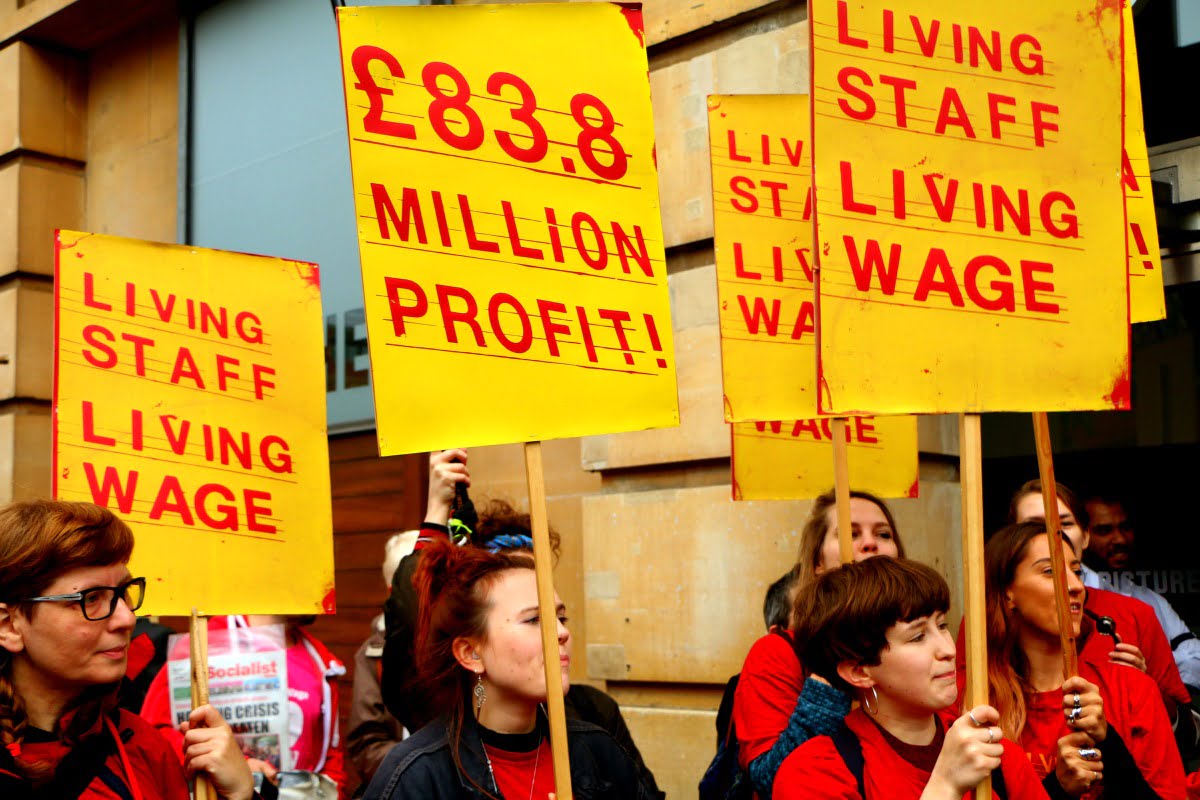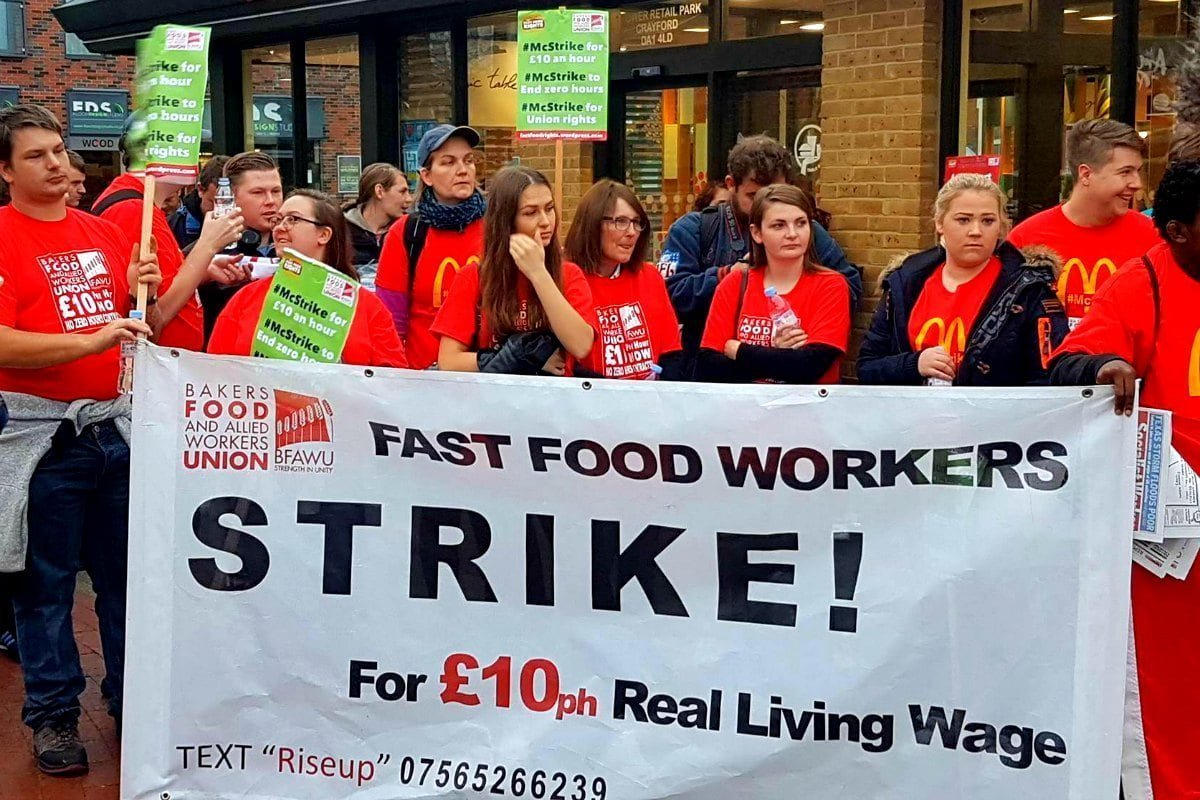The Fabian Society and Community trade union – both well known for their “gradualism” and willingness to compromise with the bosses – recently released a report entitled Future Unions, which seeks to dilute down the role of the unions in an age of zero-hour contracts, precarious work, and the gig economy. But, as Terry McPartlan explains, the way to fight these problems is through militancy and organisation.
Recently the Fabian Society – a faction of right-reformists and liberals within the Labour Party that historically has supported a “gradualist” approach of reforming capitalism – joined forces with the Community trade union (which stands on the right of the TUC) to produce a document, entitled Future Unions.
Who you gonna call?
Future Unions seeks to define some objectives for the trade union movement in meeting the challenges of recruiting workers in new industries and reversing the fall in trade union membership, which has seen trade union density in the private sector fall to just 13%.
The report is clearly an attempt to find ways of engaging with workers in areas that unions need to break into. However, there are some quite dangerous ideas presented here. For example, the report suggests that the role of unions should be more similar to that of an emergency plumber or an AA Patrol service, rather than an organisation made up of members, branches and shop stewards.
The idea that non-members can just ring up and ask for representation for example would tend to undermine trade union organisation in organised workplaces. What would be the advantage of being a trade union member if all you needed to do was ring up an emergency number if something went wrong?
Of course, the reality is that some members already see the unions in this way. However, many more understand the role of their trade union in negotiating, representing groups of workers, campaigning, and educating members. But of course, that requires grassroots organisation, with active stewards and branch officers who are prepared to stand up and fight for their members.
The idea that the TUC should become a clearinghouse for recruitment into the unions in general also raises some eyebrows. The role of the TUC should be to provide leadership, support, solidarity and education across the trade union movement. It has certainly failed to provide consistent leadership – but there is a risk in this document of reducing the TUC to merely being a post office box for the unions.

Organising the ‘unorganisable’
In cities and towns across the country there are plenty of new industries with the same old exploitative methods: call centres, fast food outlets, retail parks, leisure complexes. These all come with crappy jobs, low wages and poor conditions. Alongside this, we also now have zero-hour contracts and the insecurities of the so-called gig economy. These sectors aren’t easy to get into and recruit as they have an overwhelmingly young and very diverse workforce on part time contracts, working unsocial shifts.
But we have been here before. In the latter part of the 19th Century and the early part of the 20th, a wave of new unions were formed that gave rise to mass general unions like the Transport and General Workers Union (now Unite) and the General and Municipal Workers Union (now the GMB). They set out to organise precisely the unskilled, the immigrant workers, and other supposedly ‘unorganisable’ layers. Much of this work was initiated by Marxists, like Marx’s daughter Eleanor and in Ireland by James Connolly.
The dockers went from being desperate casual workers to some of the best paid workers in the country, on the basis of solid trade union organisation and militant action. The supposedly unorganisable immigrant and unskilled workers became the bedrock of the mass trade unions, far outweighing the numbers in the old craft unions. So clearly it can be done.
We would agree that the trade union movement needs to be more representative of young people and the diverse communities within Britain. However, that diversity will come from recruitment. The most diverse trade unions in Britain are precisely the public sector unions who organise cleaners, health service workers, bus drivers and council staff, especially in the big cities. More often than not, the diversity of the public sector unions has come about precisely because of the concentrations of BAME and female workers in low paid public sector jobs.
Many trade unions already offer courses and have networks of union learning reps. There has been a lot of discussion about the new Apprenticeship Levy also and how the unions can take advantage of this to improve opportunities for workers. But this is an auxiliary role for the unions. It shouldn’t become the main focus of the work. It would be as big a mistake to seek to reorient a union to becoming just a training organisation as it would be to set it up as an emergency plumber.
Militancy vs ‘Realism’
 The biggest error in the document however, lies in the proposal for a new “partnership” with employers, developing a “kite mark” for “good employment practices” and so on.
The biggest error in the document however, lies in the proposal for a new “partnership” with employers, developing a “kite mark” for “good employment practices” and so on.
In the aftermath of the Miners strike, a layer of right-wing trade union leaders, scared by the defeat of the strike, effectively sought a way out through developing “New Realism” which represented class collaboration by any other name: no strike agreements; sweetheart deals; keeping tabs on activists; and even working with blacklisting employers. It did not work then and it won’t work now.
Under the conditions we see today in industry, with union busting employers and the gig economy, this is simply code for selling the members short, while preserving the privileges of the trade union bureaucracy.
The reality is that there are millions now working in unorganised workplaces with next to no rights. While on the surface these workers might seem hard to organise, the truth is that they can be organised. In fact they are crying out for improvements in their working conditions and pay.
There is a huge vacuum in the workplace, which allows many working people to become simply raw material in the hands of the bosses. Fighting, militant trade unionism is the only way to reach these people and offer them a way out.
Far from watering down the role of the unions, the real task is to get into the call centres, the fast food outlets, and the big warehouses. That can only be done by offering a real vision of the future and winning young people in particular to the socialist ideas that the trade unions were founded upon. As Karl Marx and Friedrich Engels explained, we have nothing to lose but our chains.






